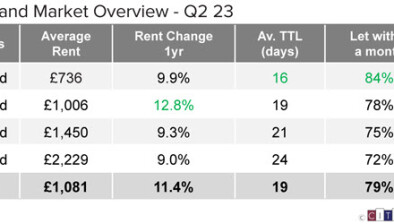Landlord refused permission to challenge £2,400 payment order to former tenant

An Aberdeenshire landlord who was ordered to pay £2,400 to her South African tenant after being found in breach of tenancy deposit regulations has been refused permission to challenge the decision.
Appellant Pei Tan argued that the First-tier Tribunal for Scotland had erred in finding that a private residential tenancy was commenced between herself and tenant Angelo Van Wyk when he initially moved into the property given the tenant’s immigration status.
The application was considered by Sheriff Ian Cruickshank of the Upper Tribunal for Scotland. Both parties made their own representations to the Upper Tribunal.
No visa requirement
The respondent moved into the let property on Schoolhill Drive, Portlethen, on 1 December 2020. He later vacated the property in January 2022 having been served a Notice to Leave by the appellant. At the outset of his time in the property he had not yet received a Biometric Residence Permit. Documentation regarding the grant of his BRP was shown to the appellant on 17 February 2021, at which point a written agreement was entered into with a deposit of £1200 lodged with an approved scheme on 16 March 2021.
The appellant considered that the respondent had previously been staying in the property by way of a holiday let due to not yet having a UK visa. It was the position of the respondent, who had moved to the UK from South Africa with his family for work purposes, that the appellant had been unhappy to provide him with a PRT and had only given him one after he informed her that he intended to raise an application with the First-tier Tribunal for written tenancy terms.
It was concluded by the Tribunal that the Private Housing (Tenancies) (Scotland) Act 2016 did not require the tenant to have a residence visa to enter into a PRT, that the facts were not suggestive of someone treating the property as a holiday home, and that the property was the respondent’s principal home throughout the tenancy. It found the appellant’s evidence to be inconsistent or unreliable in relation to certain matters, and considered an award of double the sum of the deposit to be an appropriate award.
The appellant submitted that, on the evidence, the Tribunal was not entitled to find that the PRT commenced on 1 December 2020. It had not properly considered all the evidence she had provided, which indicated that the true nature of the agreement was a holiday let until it was established the respondent had permission to stay in the UK. If at the outset he only had a visitor’s visa it was incorrect to conclude that his principal home was in Scotland.
Quality of evidence
In his decision, Sheriff Cruickshank began: “The 2016 Act seeks to strike a balance between the interests of landlord and tenant. The legislation provides security of tenure to tenants where the property is their principal home. There will be situations where an individual, for work or other reasons, resides in more than one property. It is clearly a matter of fact when a property becomes a principal home.”
He continued: “As has been repeated in numerous UT decisions, the function of the Upper Tribunal is limited as it is not an opportunity to rehear the factual matters previously argued before the FTS. My task is to decide whether the grounds of appeal disclose an arguable error of law on the part of the FTS.”
Assessing whether the appellant had raised an arguable error of law, the sheriff said: “The appellant criticises the decision reached on the quality of the evidence which was presented by the respondent. In effect, the appellant submits that the FTS should not have been satisfied with the oral evidence provided without documentary evidence to back-up what was presented. It is entirely a matter for the FTS whether it considers the evidence presented is sufficient in quality for it to reach the findings in fact in any particular case.”
He went on to say: “In essence the appellant is aggrieved because the FTS preferred the version of events provided by the respondent above her own. That is the function of the FTS when there is a factual dispute. The FTS must decide what evidence it accepts and what findings in fact it makes based on that evidence. The FTS must then apply the law to the facts it finds established. The evidence it accepted in this case was perfectly sufficient in quality, and sufficient in law, to reach the decision which the FTS reached.”
Turning to the relevance of the respondent’s immigration status, Sheriff Cruickshank concluded: “The respondent had not considered the lease to have been a holiday home. He had arrived in the UK with a large quantity of luggage for work purposes and had given up his property in South Africa. He had travelled with his family to the UK. When he returned to South Africa he stayed in hotels. He had worked from the property and his children had been home schooled there until their visas allowed them to enroll in the local school. These facts led the FTS to conclude that, in law, a PRT had been entered into and that the same commenced on 1 December 2020.”
Permission to appeal the decision was therefore refused.








